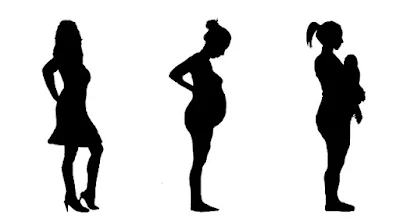Psychological Changes in Pregnancy
Pregnancy is a period of both physical and psychological changes for the expectant mother. The relationship between mother and baby begins as soon as the person finds out that they are pregnant. For this reason, how the mother-to-be spends the pregnancy process is important in terms of affecting the relationship she will establish with her baby from the moment she is born. This period when the feeling of motherhood begins to be felt can be a period of anxiety due to the changes that will occur in areas such as physical appearance, self-perception and social roles, as well as various changes in social and emotional areas.
Pregnancy Can Be A Happy And Anxious Period At The Same Time
From the moment she learns that she is pregnant, the expectant mother may feel happy with the excitement of the process, and on the other hand, she may worry about the uncertainty of the process. Questions such as how the pregnancy will go, will I be able to give birth to a healthy baby, what kind of mother will I be may occupy the minds of expectant mothers throughout the pregnancy period.
Anxiety caused by the question of whether I can be a good mother can lead to feelings of fear and guilt about making mistakes. Amid all these emotional tides, the expectant mother needs support. The support she receives from her husband, parents and friends will strengthen her coping skills and will make her pregnancy period more happy and peaceful.
Support of Spouses is Important in Pregnancy
During this period, father candidates are the biggest source of support for their spouses. Now a different period has begun in their lives as a couple. They are preparing for a pleasant and new period in which they begin to prepare for their baby to be born. In addition, a supportive social environment is an important source of strength for expectant mothers. The presence of pregnant or child-bearing people in the friend circle of expectant mothers helps to make this period, which means uncertainty for them, more predictable.
During pregnancy, expectant mothers may experience a number of physical and emotional changes. Knowing in advance what these changes may occur in their bodies and spiritual worlds will help them cope with them.
Physical and Psychological Changes During Pregnancy
Weight gain is one of the most important physical changes during pregnancy. In the first months of this period, nausea may begin, and later on, with the change in body shape, the person may experience difficulties in the movements that he used to do comfortably.
During this period, changes in the skin structure may occur. There will be differences in the respiratory, digestive and circulatory systems. All these can cause irregularities in basic vital activities such as sleep and nutrition.
At the same time, expectant mothers may experience some psychological changes during pregnancy. Crying for no reason, tension, intense anxiety and vulnerability are some of them.
Postpartum Psychological Problems
Maternity blues (postpartum syndrome)
Maternity blues that starts in the first few days after birth and resolves spontaneously within 7-10 days; It is a process that manifests itself with anxiety, distress, irritability, crying and forgetfulness.
In about 10% of mothers, this sad state turns into a more intense and serious situation. Depression that occurs during pregnancy or within one year of birth is called postpartum depression. The severity of postpartum depression varies from mild and short-term to very severe and long-lasting. This situation is expected to decrease over time between the first 1-3 months, it is very important to get professional help if the process is prolonged.
Postpartum depression (postpartum depression)
It is estimated that physical, emotional and social changes play a role in the development of postpartum depression. Considering the physical factors; It is stated that there is a relationship between postpartum depression and the rapid decrease in postpartum estrogen and progesterone levels that rise during pregnancy. In addition to the effect of childbirth on the female body, irregular and insufficient sleep and physical fatigue can also be effective in the formation of depression.
Considering the emotional factors; Although all women giving birth have similar hormonal changes, it is seen that only a part of women develop psychological disorders. For this reason, it should not be forgotten that spousal and family support, social support systems and interpersonal relationships are very important in order to be protected from psychological disorders that may occur after birth.
Finally, expectant mothers to see the pregnancy period as an exciting period in which they begin to experience the feeling of motherhood until they give birth to their babies, not as a stressful period that has been taken away from their control of their lives, will enable them to enjoy this period.
Psychological Support Recommendations for Pregnancy Period and After
- Seek support from your spouse, family, and social circle. During this period, it is natural for expectant mothers to experience emotional ups and downs and to feel tired, helpless and anxious from time to time. In such moments, getting support from one's close environment will make it easier for him to cope with these emotional reactions.
- Do not hide your feelings. In this process, remember that you may experience feelings of anxiety, unhappiness and anger as well as happiness. Do not hide and suppress your feelings.
- Avoid making major routine changes during and after pregnancy.
- Don't try to be the 'perfect mother'. You just have to be a “good enough mom”.
- Try to take time for yourself too . Do not distance yourself from your circle of friends and activities that you enjoy doing.
- As much as possible, sleep or rest when the baby is asleep.
- Be flexible. In this period when you take your first steps towards motherhood, remember that you are trying to get to know your baby and your baby is trying to get to know you. Remind yourself that you are in a period of getting used to each other.




















0 Comments